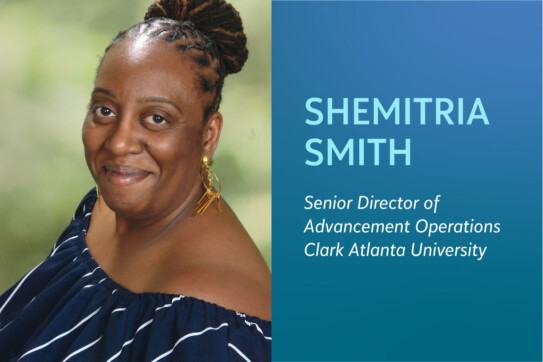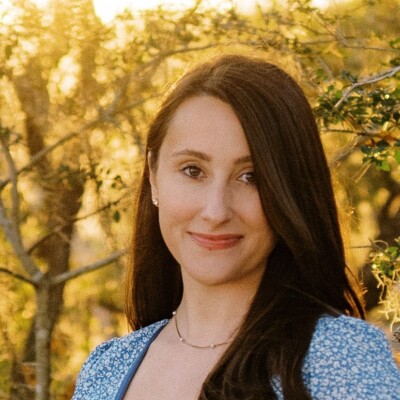Changemaker Spotlight: Shemitria Smith, Clark Atlanta University

This Q&A series aims to provide readers with valuable insights from changemakers across the social impact community.
Shemitria Smith, M.Ed. is responsible for the overall advancement services at Clark Atlanta University as the senior director of advancement operations. She has a robust background working with fund development programs and implementing new practices with her team.
Q1: What led you to working in higher education?
I actually stumbled into higher education but once I came into it, I felt like it was exactly where I needed to be. I had worked at an Atlanta-based nonprofit for over 16 years when I felt like God was calling me to do more but I wasn’t sure exactly what. After walking my talk, I leaned into my faith in God and stepped into the unknown. When I stepped into the unknown, God opened doors that I would never imagine.
With over 16 years of Raiser’s Edge NXT® experience at that time, the University had just switched over to Raiser’s Edge from Banner and was looking for an “expert”. They found my resume and asked me to come interview. When I stepped on campus, a calmness washed over me like I was being placed in an environment in which I needed to be on and vital to my journey.
Since being in this environment (which is very different from a nonprofit environment) I have been able to really dive into advancement operations in different levels and how it all connects in more ways than I could ever imagine or fathom. I am still learning to this day how to make processes smoother and how we can engage our supporters and the community through relationship management and Blackbaud solutions.
Q2: What’s your advice to someone who wants to grow their career in advancement operations, particularly someone who is aiming to get into a leadership role?
Know that this is a journey, not a race. When people think of a development department, most put emphasis on the fundraisers, which is great but there is a whole other side to it – the operations. I call it the brain. This is the team that pays attention to the details. We look at tons of data and make it make sense. We are the ones that thank our donors, find the best prospects within our database and really make the data tell the story.
I will say in looking at any leadership role, take the time to learn the importance of all positions. Learn how to do the actual position. A leader should be able to step in when needed and help to keep the ball rolling. Be patient with yourself and never stop growing and learning.
Q3: What type of critical needs come up in the advancement office, and how do you and your team pivot when it’s received on short notice?
In the advancement office, since we deal with all of the data, gifts, and reporting, you can definitely be assured that critical needs are very common. Our office is usually always in busy mode, but in the midst of a comprehensive campaign, all systems are at a heightened sense. Gift and data lists and reports are always last minute requests. Research requests with donors are critical, especially if a director of development was doing an ad-hoc meeting with no notice. I always say that the donor doesn’t care who sits in the seat – it is the organization’s responsibility to know the importance and that is only through the data.
My team is dynamic and they work hard to make sure that the advancement team is on target and deadline each month. When last minute requests come, we always make sure to communicate with the requestor to get a clear understanding of what is needed and an estimated timeline of completion. We want you to know that we are here to work with you, even in the midst of heightened progression, to ensure that you are successful.
Because the things we do aren’t ran simply by a click of the button, we feel that having that open communication allows the requestor and us an opportunity to be on the same page from the beginning and we can complete the request the right way the first time.
Q4: You wrote a book called Flip The Script: Change Your Thinking, Change Your Life, which focuses on leading a life of positive thinking. What is one key piece of advice you’d give to social impact professionals (working in nonprofits, arts & cultural organizations, higher ed, K-12 schools, etc.) on how they can apply this mindset to increase their impact at work?
I will be the first to say that this is not easy work, this is “heart” work. And we all know heart work is hard work. But what makes it doable is how we do it. Which hopefully it is with love, with kindness, with patience, with gratitude – with positivity. When you move with those components, it allows you to focus on the mission of why you are there and really the impact that it causes through each person who is the recipient of the cause. We are all rare and we each carry our own gifts and talents. When we tap into those talents and use them for the benefit to serve, we just move differently. This work doesn’t feel like work.
So I will just say remember the why and don’t get involved if you can’t figure out the why.
Q5: You’ve played a critical role in transforming processes at Clark Atlanta University – moving donations, ticket sales, and event registrations from paper to online, aggressive database cleanup, implementing training, etc. Transformation requires change management, however. How did you partner with others in the organization to bring them along on the journey?
In everything, I believe it takes a village. True success isn’t just about one person. So I know that teamwork is important. I started conversations with them (I call it bridge building) so that we can talk through all of the steps involved – what we currently have and what we would need and what it would take to implement and move forward. With everyone’s input, each person felt like their opinions mattered and was instrumental in helping to launch the program off the ground. Even with the transition of our Director of Scholarship, she was very new but very much 100% in making it happen as a lot of the work and actual steps of implementing the program fell into her lap and area. We met weekly diligently and even once we launched and to this day, we still meet weekly just to ensure that the program is running efficiently, the data is current and the partnership stays strong.
Q6: What accomplishment are you most proud of in your career?
One of the major accomplishments I hold dear in my career is the collaboration and success throughout campus of partnership in a solution. The University had a system for about 3 years that we were not doing anything with. I was graced to be instrumental in not only reviving this solution but bringing all the players to the game so that we could collectively work on utilizing this software. After a year of work, we were able to successfully launch and implement the product which resulted in us giving out more than $1m in scholarships in the year of implementation versus the previous year when we did not have the software in use.
Q7: What are some of the many hats that a Senior Director of Advancement Operations have to wear?
I have been in my position for about 6 years (as senior director) and even to this day, I am learning that there are many more hats that you have to make room for. We are the holders of the database and the knowledge of our donors. It is our responsibility to know how much to know the numbers such as dollars raised, number of donors, giving rate, IRS requirements, scholarship and endowment answers, IRS rules and requirements, database systems, prospect management knowledge, grant management processes, technology and software solutions, budget codes and school’s policies and procedures.
We become the person that everyone within the team works with in some capacity – for data discussion and analysis to best strategies in fundraising initiatives, we become that person to help execute and implement the plan.
Q8: What is the best advice you’ve received that has helped to guide the way you lead?
Always lead with kindness and in a manner in which you would want to be led. Always lead with integrity and grace. And remember that we are all a work in progress. Team Work Makes the Dream Work and don’t be afraid to jump in and assist when needed. It is important to know the responsibilities of those you lead and always look for the solution.
